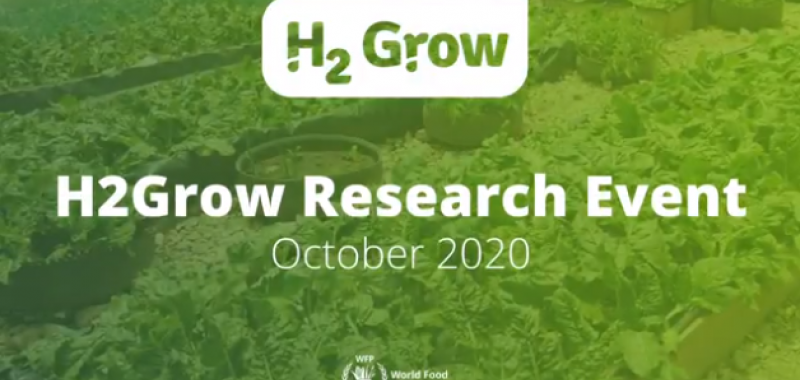H2Grow, an innovation under the World Food Programme (WFP) Innovation Accelerator’s Scale-Up Enablement programme, recently brought together a global group of hydroponics experts in a 3-day research event to discuss hydroponics in the humanitarian and development context. The virtual event, which took place in October 2020, aimed to make hydroponics knowledge more accessible to the field, and vice versa. The topics were chosen based on the most pressing issues currently slowing down the scaling of the initiative. These issues were identified through analysis of different field use cases across various countries.
“We are extremely grateful for the high-level of participation and support from our amazing facilitators, for example Marc Beckett from the Fraunhofer Institute.” — Manuela Zierau, Global H2Grow Project Lead, WFP.
This virtual event was composed of three workshops, each of them following a different concept. The first workshop focused on locally available materials and climate smart design for hydroponics units; the second workshop focused on nutrient solutions; the third workshop focused on solving key bottlenecks at scale. During the workshop on materials for hydroponics units, multiple case studies from the field were showcased and discussed. During the nutrient solutions workshop, participants were asked to design their “own organic nutrient solution” in break-out sessions en par with inspiring presentations from experts from the German Aerospace Center (DLR), the Food and Agriculture Organization (FAO), the University of Bologna, and Sheffield University. The event also provided a unique opportunity to collaboratively design the H2Grow Research Award for homemade nutrient solutions; an award aimed at sourcing and awarding solutions created by communities.
“My individual contribution: I am interested in developing organic nutrient solutions further and support the set up of a compendium of case studies from the field.” — Marc Beckett, Research Scientist, Fraunhofer Institute.
“We feel lucky to be part of a global community of people passionate about positively impacting people’s lives through hydroponics. And we are excited to continue the global knowledge sharing through the digital H2Grow community and training platform.” — Chiara Herold, Scale-Up Enablement Consultant, WFP.
Among the group’s most significant discussions was tackling the issue of bottlenecks in the scaling up of hydroponics projects. How can the global community address issues such as limited access to markets and the need for locally relevant research? Here are some of the high-level outcomes from the discussion:
- Create an active community of practice. It is very important to create a community of practice when implementing hydroponics in the field. Field teams should practice knowledge sharing by compiling success stories and case studies. Establish an engaged community of “hydroponic nerds”.
- Listen to hydroponic farmers and other users. Ask them about the challenges they are facing and how they are overcoming these issues.
- Involve local institutions and governments for technical assistance and follow-ups and continue training of trainers. This is essential for long-term success.
- Study each area separately. Bring community members with different expertise to the field and ideate on location, design solutions in interdisciplinary teams and identify individual solutions for each context.
- Use recyclable and upcycled materials. Especially in refugee camps and areas of severe underdevelopment, recycled/upcycled materials can be key inputs for hydroponic units.
- Design and develop alternative approaches. Even in contexts with a pre-existing hydroponics culture, there is an opportunity to simplify and lower costs.
WFP’s H2Grow project brings locally-adaptable and affordable hydroponics solutions to vulnerable communities around the world. Across its portfolio of solutions, the H2Grow model is always being adapted to the local context with the farmers themselves. This way, a variety of creative technical solutions have been tried and tested, especially when it comes to the set-up of hydroponics structures.
If you are an expert in this field, are currently working with hydroponics, or would like to start a project you can apply until 26 November 2020 to be part of the first cohort joining the digital H2Grow platform here.



